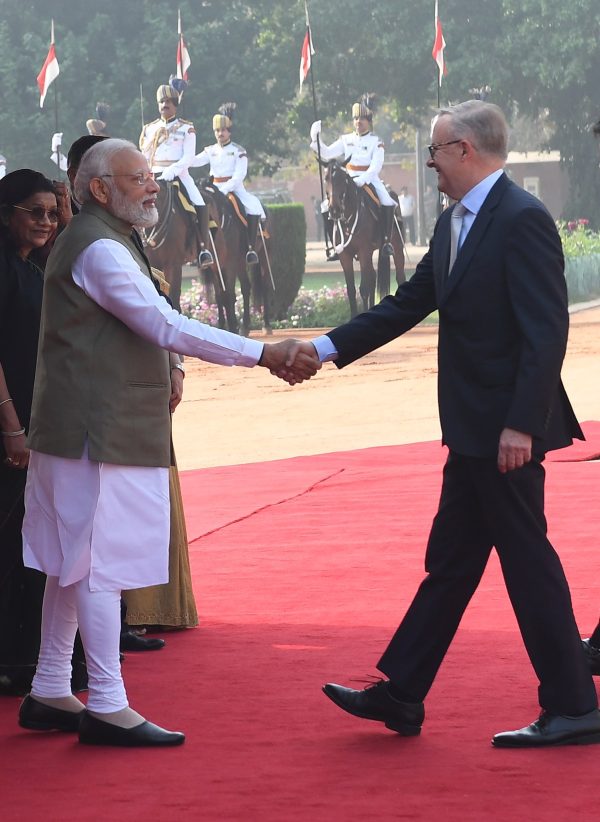
The prime ministers of India and Australia on Friday expressed concern over an “increasingly uncertain global security environment” and committed themselves to strengthen their defense and security partnership to ensure stability in the Indo-Pacific.
Both countries are working to strengthen the Quad, an alliance of Australia, India, Japan, and the United States that aims to counter China’s rising influence in Asia.
Australian Prime Minister Anthony Albanese, on a four-day visit to India, and his Indian counterpart Narendra Modi did not directly refer to Russia’s war against Ukraine but they praised their two countries’ growing cooperation in defense and security. That relationship includes logistical support, information exchanges, military exercises, and scientific and technological cooperation, Albanese said in a statement to reporters after his talks with Modi.
“Prime Minister Modi and I discussed an increasingly uncertain global security environment and committed to strengthening the Australia-India defense and security partnership to address shared challenges and work toward an open, stable and prosperous Indo-Pacific,” Albanese said.
The two countries also agreed to expand their cooperation in climate and energy, particularly solar and hydrogen, which are critical to energy transition goals, Albanese said. The two leaders also underlined the importance of working more closely to secure critical mineral supply chains, he said.
Albanese invited Modi to attend a summit of the Quad member-countries to be held in Australia in May.
Modi said in a statement that he raised in his talks with Albanese recent attacks on Hindu temples in Australia where Indian immigrants are the second-largest demographic. Media reports said the attacks were carried out by Sikh separatist groups. He said Albanese assured him the safety of the Indian community was a priority for him.
At an earlier media briefing on Friday, Albanese was asked to explain his country’s position toward China after he described India as a “top-tier security partner.”
“We need to ensure that Australia’s defense assets are the best they can be, and that we build our capability. At the same time, we need to build relationships. That’s what I’ve been doing. I’ve been doing that here in India, we’re doing that throughout the Indo-Pacific. We’ve … improved our relationship with China in recent times as well,” he said.
The Indian Ocean is central to both countries’ security and prosperity, Albanese said in a tweet on Thursday, adding that “we are working together to ensure the Indo-Pacific is open, inclusive, and prosperous.”
Albanese was also asked Friday about the recent raid by India’s tax officials on the BBC offices in New Delhi and Mumbai after the BBC aired a documentary that was critical of Modi.
“Australia stands up for press freedom. But India is a great democracy, and to dismiss that is, I think, wrong. … Where there are differences or issues to be raised, we raise them privately and appropriately,” he said.
On Thursday, Albanese briefly watched a cricket test match between Indian and Australian teams in Ahmedabad in Modi’s home state of Gujarat.
Albanese also met Indian business leaders in Mumbai, India’s financial and entertainment capital, and visited India’s homemade aircraft carrier INS Vikrant, which was commissioned in the Indian navy in September.
He told the business leaders that now could be a turning point in accelerating economic cooperation and mutual benefits in the relationship between the two countries.
Albanese, who is accompanied by a delegation of business leaders, said earlier this week that India, along with Indonesia, would grow to be the third- and fourth-largest economies in the world, which presented “an incredible opportunity” for Australia.
A bilateral trade agreement that came into force in December last year is expected to vastly tap the trade potential between the two countries as 96 percent of Indian goods exports can now enter Australia duty-free. Likewise, 85 percent of Australian goods exports can enter India duty-free.
In the 2022 fiscal year, India was Australia’s ninth-largest trading partner and they hope to double trade in the next five years.
India’s exports to Australia totaled $8.3 billion and imports from the country stood at $16.7 billion in 2021-22, according to the economic think tank Global Trade Research Initiative.
While India’s exports range from agriculture, garments and railway engines to telecom, 95 percent of India’s imports from Australia are raw materials and mining products needed by Indian industry.
Australia Aims to Bolster Security, Economic Ties With India
Source: Frappler

0 Comments